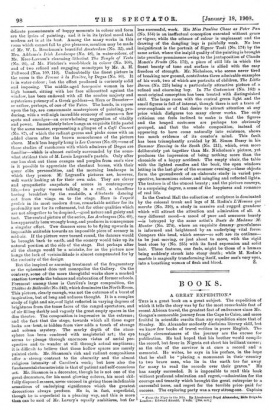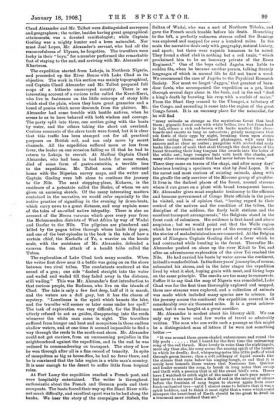BOOKS.
A GREAT EXPEDITION.*
THIS is a great book on a -great subjeet. The expedition of which it tells the story was by far the most remarkable feat of recent African travel, the greatest feat of endurance since Mr. Grogan's memorable journey from the Cape to Cairo, and More fruitful in scientific results than any expedition-since that 'of Stanley. Mr. Alexander modestly disclaims literary skill, but- we know few books of travel written in purer English. The tragic circumstances of the journey are the excuse for publication. He had hoped that his brother would compile the record, but fever in Nigeria cub short his brilliant-career ; so the aim of the survivor. is at once a record ' and a. memorial. He writes, he says in his preface, in the, hope that he :shall be " placing a monument in their --country to two brave men, who lie in the earth too far away for many to read the records over their grates." Ho has amply succeeded. It is impossible'to read ' this book without profound admiration and regret,—admiration for the courage and tenacity which brought the great enterprise to • a successful issue; and regret for the terrible price- paid for success.- The 'exploring party warteorerystrongone. - Captain' • From the Niger to the Nile. By ,Lieukenant Boyd Alesander,likle Brigade. London : Ethyard'Arnoldi 2 Vela. - [360. net.1 :Claud Alexander andlir. Talbot were distinguished surveyors and geographers ; the writer, besides having great geographical attainments; was a devoted ornithologist ; while Captain Gosling was a mighty hunter and a keen naturalist. Nor must Jose 'Lopes, Mr. Alexander's servant, who had all the resourcefulness of Ulysses, be forgotten. The travellers were lucky in their "boys," for a number performed the remarkable feat of staying to the end and arriving with Mr. Alexander at. Khartoum.
The expedition started from Lokoja, in Northern Nigeria, and proceeded -up the River Benue with Lake Chad as its objective. The work in this section was mainly topographical, and-Captain Claud. Alexander and Mr. Talbot prepared full maps of a hitherto unsurveyed country. There is an interesting account of a curious tribe called the Kerri-Kerri, who live in fastnesses on the little outcrops of stony hills. which stud the plain, where they have great granaries and a breed of ponies which never descends from the plateau. Mr. Alexander had some trouble with hostile natives, when he: seems to us to have behaved with both-wisdom and courage. The party split into three, one section going with the boats1 by water, and the others taking the short cut overland. Curious remnants of the slave trade were found, but it is clear -that this traffic has been stamped out for all practical purposes on British soil, and can only move by secret channels. All the expedition suffered more or less from fever, the leader oirone occasion falling so ill that he had to
return to Lokoja to recruit. At Maifoni Captain Claud Alexander, who had been in bad health for some weeks,: died of some form of gastro-enteritis, a terrible loss , to the expedition.- Mr. Talbot soon after returned: home with the- Nigerian survey maps, and the writer and
*Captain Gosling were left alone to continue the journey. to the Nile. The next stopping-place, .Kukawa, is the - residence of a potentate called the Shehu, of whom we are given an amusing, sketch.- Of the many interesting matters. contained in the narrative, we would refer especially to the native practice of signalling in the evening by drum-beats, which carry news to a great distance, and may explain some of the tales of so-called native telepathy. There is also an account of the Mecca caravan which goes every year from the Mohammedan districts of West Africa by way of Wadai and Darfur to the Nile. The pilgrims are plundered and killed by the pagan tribes through whose lands they pass, and one of the best episodes in the book is the tale of how a certain chief, the- Kachella of Yo, a warrior on the heroic scale, with the assistance of Mr. Alexander, defended a caravan from. the attack of a bandit tribe called the Tubbs.
The exploration of Lake Chad took many months. When the writer first drew near it a battle was going on on the shore between two rival tribes. The combatants scattered at the sound of a gun ; one side "dashed straight into the .water and waded and waded till they faded away in the distance, still wading." This was Mr. Alexander's first introduction to that curious-people, the Buduma, who live on the islands of Chad. The lake is only a few feet deep, half of it is marsh, and the waters are a dull grey, but it has the charm of mystery. "Loneliness is the spirit which haunts the lake, and the traveller will sooner or later come under her spell." The task of exploration was very difficult, for the Buduma -utterly refused to act as guides, disappearing into the reeds whenever the white man came in sight. The travellers suffered -from hunger and heat and mosquitoes in those endless shallow waters, and at one time it seemed impossible to find a way through the reedsto the south-east shore. Mr. Alexander -could not get carriers, from an unreasoning prejudice in the neighbourhood against the expedition, and in the end he was reduced to commandeering ox transport. The story of how he won through after all is a fine record of tenacity. In spite of mosquitoes as big as house-flies, he had no fever there, and he is convinced that the lake region is a white man's country. It is near enough to the desert to suffer little from tropical rains.
At Fort Lamy the expedition reached a French post, and were hospitably entertained. The writer is throughout enthusiastic- about the French and - German posts and their occupants. The boats forced their way up the Shari River with- out much difficulty, and excellent sport was to be had along the banks,. We hear the story- qf the campaigns of .Rabeh, the
Sultan of Wada.i, who was a sort of Northern Tchaka, and gave the French much trouble before his death. Branching to the left, a perfectly unknown stream called the Bamingi was explored and mapped for over a hundred miles. In the main the narrative deals only with geography, natural history, and sport; but there were wayside humours to be noted.
They found a chief clad in nothing but a red tunic, "which proclaimed him to be an honorary private of the Essex Regiment." One of the boys called Jagoba was liable to sudden fits, when he became another person, talking fluently languages of which in normal life he did not know a word. We recommend the case of Jagoba to the Psychical Research Society. Nor must we forget Jaggra,' that greatest of barn- door fowls, who accompanied the expedition as a pet, lived through several days alone in the bush, and in the end "died a king's death by bursting his crop with a surfeit of maize."
From the Shari they crossed to the Ubangui, a tributary of the Congo, and ascending it came into the region of the great Congo forest. It is an uncanny place for the naturalist, for he will find
"many animals as strange as the mysterious forest that bred them ; gigantic forest rats with white bellies, two feet from head to tail, others a rich red-brown with backs marked like chess- boards and snouts as long- as ant-eaters ; grizzly mongooses that rob fowls of . their eggs by night, breaking them upon stones .before eating them; sweet-faced phalangers, with eyes like saucers and as clear as amber ; pangolins with arched and scaly backs like coats of mail, that steal through the dark places of the forest thrusting their long tongues like swords into the holes of the white ant; huge vampire bats with teeth like sharks, and many other strange animals that had never before been seen."
Therethey cameon traces of the okapi, and after many days' laborious hunting a specimen was shot by Jose Lopes. It is the rarest and moat curious of existing animals, along with the giraffe the only survivor of the Miocene group of girafi,dae. It lives in the darkest places of the forest, around streams where it can graze on a plant with broad transparent leaves. Mr. Alexander gives most emphatic testimony to the efficient
and humane-government of Congo State officials in the parts he visited, and is of opinion that, "having regard to their control of the natives and the condition of the tribes, the discipline of the soldiers, the finely built stations and the excellent transport arrangements," the Belgians stand in the front rank of colonisers. His evidence is-first-hand and above suspicion ; but we would point out that the Welle regiox which he traversed is not the part of the country with which the stories of maladministration are connected. At the Belgian port of Niangara Captain Gosling died of a fever which he had contracted while hunting in the forest. Thereafter Mr. Alexander pushed on alone up the .river Kibali to lei, and after an adventurous exploration of the river Tel reached the Nile. He had carried his boats by water across the continent, in itself a wonderfulfeat. In the three years' journey he, of course, exhausted his stores, and in the later stages the expedition lived by what it shot, buying grain with meat, and hiring bop on the same principle. The results are too many to enumerate. Suffice it to say that the map bf Nigeria was remodelled,La.ke Chad was for the first time thoroughly explored and mapped, three new streams were explored, and a collection of animals was made which included many species new to science. In the journey across the continent the expedition covered in all considerably over six thousand miles. It is a great achieve- ment, but it was bought at a great sacrifice.
Mr. Alexander is modest about his literary skill. We can only say we have read few works of travel so admirably written. The man who can write such a passage as -this might be a distinguished man of letters if he were not something better :— "It was around_ these green-shaded watercourses and round the
lily pools that I heard for the first time the entrancing song of the red thrush. More lovely in voice than the nightingale, more shy than she, his song seems the soaring spirit of the haunts in which he dwells ; first, whispering notes like little puffs of wind through green. leaves ; then a soft soliloquy of liquid sounds like the stream that runs below his singing-bough, so sad that it is surely here beneath these waters that Narcissus lies. Quicker and louder mounts the song, to break in long notes that swoop and thrill with a passion that is all the sweet bird's MIL Hours have I watched.to catch sight of the maker of such pure music— but never to see more than a flash of red in the interval of silence before the fountain of song began to shower again from some fresh-enchanted tree—until I almost came to believe that it was a spirit bodiless, and to think it most right that a voice which could interpret the heart-beat of Earth should be trio great to dwell in a tenement more confined than air."







































 Previous page
Previous page